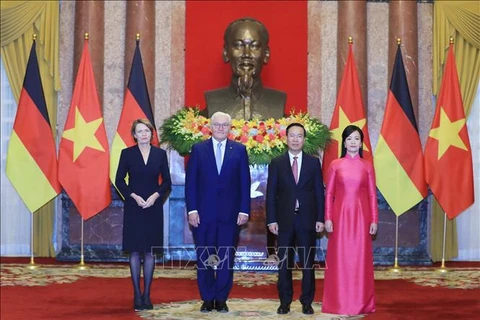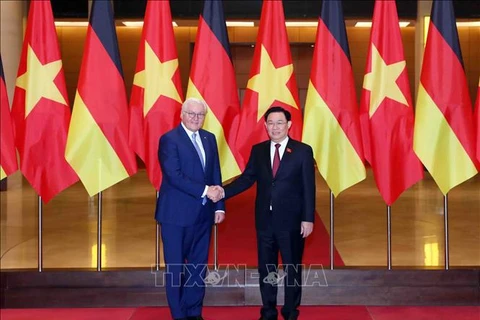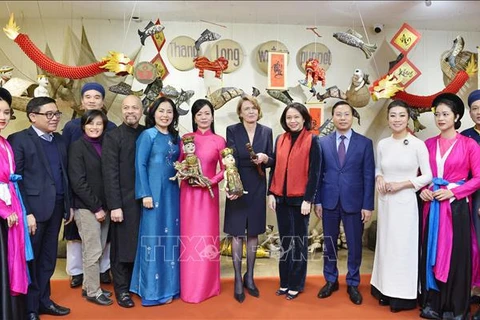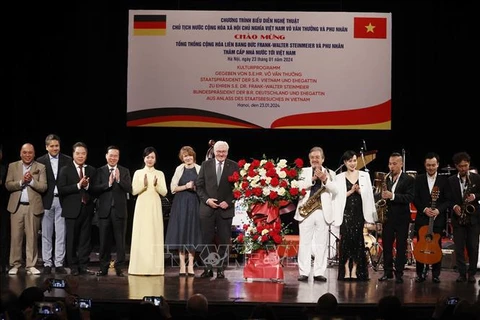 Prime Minister Pham Minh Chinh (R) welcomes German President Frank-Walter Steinmeier in Hanoi on January 24 (Photo: VNA)
Prime Minister Pham Minh Chinh (R) welcomes German President Frank-Walter Steinmeier in Hanoi on January 24 (Photo: VNA) He thanked Germany for providing a large number of COVID-19 vaccines to Vietnam, helping the country control the pandemic and promote its socio-economic recovery.
Chinh affirmed that Vietnam highly values the role and position of Germany in the region and the world, and wishes to further deepen partnership with the European country in all fields.
For his part, the German President hailed the dynamic economic development of Vietnam over the years.
The two leaders rejoiced at the progress of bilateral relations in the past decades, especially the efficiency of joint projects such as the Vietnamese-German University and the German House in Vietnam.
PM Chinh briefed his guest on major achievements of Vietnam in socio-economic development and international integration throughout the nearly 40 years of “Doi Moi” (Renewal).
He said that Vietnam is focusing on making strategic breakthroughs by completing the institution, developing the infrastructure system, promoting human resources, and restructuring the national economy in association with renovating the growth model, giving priority to boosting the digital economy and digital transformation, green growth, and circular economy.
Vietnam also aims to strengthen science-technology development and innovation, while making responsible commitments to climate change response, he said, stressing that these are areas in which Vietnam hopes to foster cooperation with Germany.
 An overview of the meeting between Prime Minister Pham Minh Chinh and German President Frank-Walter Steinmeier in Hanoi on January 24 (Photo: VNA)
An overview of the meeting between Prime Minister Pham Minh Chinh and German President Frank-Walter Steinmeier in Hanoi on January 24 (Photo: VNA) Affirming that economics, trade and investment are the pillars of bilateral relations, the two leaders agreed to continuously encourage German businesses to invest in Vietnam, especially in the fields Germany has strengths such as energy, railways, medical equipment, pharmaceuticals and infrastructure.
PM Chinh proposed Germany soon ratify the EU - Vietnam Investment Protection Agreement (EVIPA), continue to cooperate with Vietnam to effectively implement the Just Energy Transition Partnership (JETP) in which Germany is a participant so that Vietnam can achieve its emission reduction goal as committed at the 26th UN Climate Change Conference (COP 26), as well as in the implementation of development cooperation projects funded by Germany in the coming time, with priority given to infrastructure construction, sustainable development, and renewable energy.
The two leaders also reached a consensus on stepping up collaboration in high-quality human resources training and development, and speeding up the building of cooperation mechanisms and frameworks in vocational training. The German President expressed his hope that the Vietnamese workforce will soon have an opportunity to work in Germany to help the country deal with labour shortage in the coming time.
The host suggested the guest continue assisting and creating favourable conditions for the community of more than 200,000 Vietnamese people in Germany to successfully integrate into, contribute more to socio-economic development of Germany, and act as bridges connecting the two countries. The German President spoke highly of the Vietnamese community in Germany and considered it a valuable asset in the relationship between the two countries and two peoples.
Discussing international and regional issues of mutual concern, the two leaders emphasised the need to maintain peace and stability, and solve disputes by peaceful means in accordance with international law. They stressed their backing for the freedom of navigation and overflights in the East Sea on the basis of international law, including the 1982 UN Convention on the Law of the Sea (UNCLOS)./.
VNA























